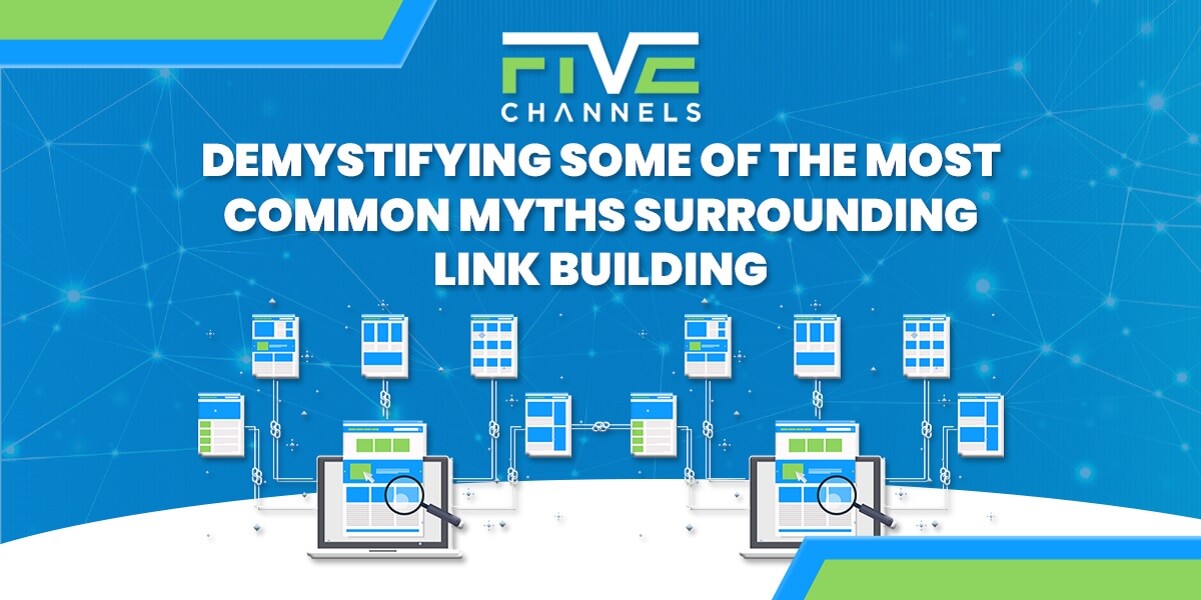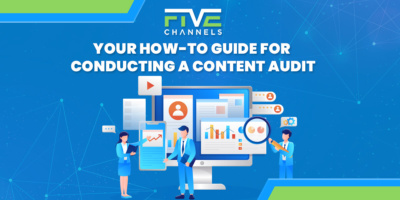In a recent review, 41% of businesses said they felt link-building was the most challenging SEO technique for their brand to master.
If you’re struggling with your own link-building efforts, you’re in good company. However, this process doesn’t have to be nearly as challenging as it comes across. You see, the reason why so many businesses struggle is largely due to the amount of ridiculous link-building myths floating around the SEO world.
Fortunately, you won’t be one of those businesses confused and mislead by link-building myths. If you’re ready to give your link-building strategies an upgrade and ditch the misguided backlink advice you’ve heard in the past, you’ve come to the right place.
Follow along as we disprove some of the top link-building myths we have ever heard and tackle the tips you need to succeed.

Linking Doesn’t Impact Rank
First things first, let’s get this ridiculous myth out of the way. We’re not entirely sure how linking has landed a reputation for being useless for SEO, but it’s definitely not the case.
Both internal and external links play a few key roles in the SEO process.
Internal linking plays into what we call on-page SEO. Your on-page techniques are what help Google’s bots crawl and understand your content as well as improve your usability rating.
First and foremost, bots use links to navigate from page to page. This means that internal links are essential to have your content properly crawled and indexed. Beyond basic navigation, your linking structure within your site also sends Google key messages about your content’s importance and authority.
Backlinks, on the other hand, contribute to your site’s off-page SEO. After Google has gathered what your content is about, your off-page SEO techniques are what let the engine know where to rank you for those topics and keywords.
By having quality backlinks, Google will get the impression that your page is popular and will reward you with higher authority on the SERPs.
Backlinks Are the Top Google Ranking Factor
From one extreme to the next. Although link-building is definitely an essential SEO factor, we can never truly know what the top ranking factors for Google’s algorithm are.
Although we do know (or have evidence) of certain techniques raising boosting rank, the order of importance is more or less a mystery. This is because the algorithm’s goal is to create a genuine and reliable experience for users. That being said, if Google were to release exactly what you need to do to hack the system, the entire process would be pretty pointless.
In short, you’ll still need to invest time into your other SEO techniques such as optimizing your content and improving your site speed to ensure you score a boost on the SERPs.
No Follow Links are Dead Ends
No follow links are something you’ll come across when guest posting or guest blogging, especially for high-authority sites. These links contain a special instruction for Google to not follow the path of the link.
Remember how we mentioned earlier that Google bots use links to hop from page to page? With this no-follow instruction, the crawlers simply don’t navigate over to your page. Unfortunately, this means that you won’t be able to borrow authority from that host page for your content as you would with a normal link.
Because of this many businesses and even marketers have deemed recruiting these backlinks as useless. There are, however, a few reasons why you should still pursue these opportunities.
First, these links still work to drive traffic to your website. This can be incredibly helpful, especially when you’ve gained a mention on a popular site. In addition to this, your brand or product mention here also gains you a respectable amount of authority with your audience.
Next, although these links aren’t necessarily the best, they do diversify your backlink profile and make your SEO efforts look more genuine. Of course, just because Google doesn’t follow the link doesn’t mean it’s invisible altogether. The bots still take note of your link which may or may not impact your own authority.
You Should Only Have High DA Links
We get it, targeting sights with high domain authority is the logical choice to borrow equity and boost your own authority. The problem here is that targeting these pages exclusively can cause you to miss out on great linking opportunities elsewhere.
As we mentioned above, high DA sites are likely going to use no-follow links. Lower authority sites on the other hand are more likely to give you the backlink that you set out for, and with much less competition.
Contrary to popular belief, domain authority isn’t the only thing Google is taking into consideration with your backlinks.
The engine is also looking at the quality of your links to ensure you aren’t just spamming the internet with irrelevant links. With that in mind, your focus should be on gaining backlinks from sites that are relevant to what you do or offer.
In addition to this, search engines want to see that links are actually adding value to the content. If you’re gaining links to a page that has no relation or added value to the linking source, that link may do more harm than good for your rank.
All in all, the best approach is to reach out to a mixture of websites that are relevant to your niche.
You Must Spread Out Your Link-Building
Google has gained a reputation for being pretty smart when it comes to catching spammy behavior. This is probably why so many brands think that gaining too many links in a small period of time can be bad for your reputation.
While this might be true if your links are bought from spammy sites or left in the comments of irrelevant posts, the truth is that there’s no set limit to how many genuine links you can gain in a day, week, or month. As long as your links are from genuine sites with good quality ratings, you’ll never be punished for getting your name out there.
Guest Blogging is Dead
Guest blogging is anything but dead as far as a valid link-building strategy.
Again, many brands have jumped to this conclusion due to the no-follow links that big guest blogging websites are dealing out. However, without guest blogging, you’ll likely find it pretty darn challenging to gain a respectable number of links at all.
Beyond asking for links from your business contacts and creating great, sharable content, you won’t have a ton of options for recruiting genuine links. Guest blogging offers you the chance to link back to your site in a relevant and meaningful way.
When done properly, the links from your guest posts can and should look like you’ve been genuinely recommended by that website. By writing from the host’s point of view and subtly making mention of your brand, product, or page, you can appeal to Google and future customers all at the same time.
The More the Merrier
Okay, so you don’t need every link to be from a high DA site, however, this does not mean that you should go out and collect just any old link you can.
The problem with hunting for quantity over quality is that many of your backlinks could actually end up being toxic to your site. This is because Google is in fact checking up on those links to make sure you aren’t being dodgy.
As we mentioned above, you’ll want to make sure that your links add value and quality to the internet rather than to fool the system. While having more links can be beneficial, always prioritize quality over quantity.
Asking for Links is Spammy
Let’s be honest, without asking for links, you likely won’t get any.
Whether it be reaching out to your fellow business owners to exchange links or sending guest posts to publishers, the only real way to take control of your backlink building is to ask.
Yes, great content does have a better chance of being shared naturally. This then does earn you a genuine and organic link, however, the chances of your content being found and linked to without a little help are pretty slim. Now that’s not to say you shouldn’t keep creating great content, this should always be a priority.
While we wouldn’t suggest spamming your followers and forums with requests for links and sharing, there’s definitely nothing wrong with building up your link-building strategies with a well-written proposal. Even the most shared websites in the world started somewhere, so don’t be ashamed to reach out, just keep it professional and genuine.
Your Anchor Text Doesn’t Matter
Anchor text is what your links are attached to, and contrary to popular belief, it should be the most strategic text on the page.
A while back, everyone believed that your anchor text should be an exact match for your keyword. Unfortunately, gathering large volumes of links with the same keyword raises alarm bells for Google and could earn you a penalty. This then somehow transformed to brands linking to a plethora of unhelpful phrases.
At the end of the day, your anchor text is actually playing a role in how Google reads your content. By taking the anchor into consideration, the bot then has a bit of a hint as to what your content will be about and where to index it.
With this in mind, using an anchor that has little to nothing to do with your page is actually working against your link-building strategies. Instead, take your keywords into consideration and try to be as accurate and descriptive as possible with your anchor text.
If you’re linking to a sales page, you may benefit from using “best deal on (your product here).” For blog pages, keep it within the keyword, but avoid the exact match by using add-ons like “link-building tips for 2021.”
Link Building is Only for SEO
You’ve likely already gathered from what we’ve shared above that link-building is a highly beneficial practice for your entire online approach. Not only do internal and external links help your SEO, but they also help to build authority as a brand and earn the trust of your followers.
At the end of the day, even if a link adds absolutely no value to your rank, it’s still a clear path for users to discover your content. What’s more, is that if you’ve done your job well, the link will be situated on a site that your target audience is already on.
By reaching this relevant audience and driving them to your website, you’ll have an even better chance of converting the browser into a buyer.
All in all, links make your website more visible, drive more traffic, and boost your reputation for an overall impressive result.
Link Building Myths Busted
Now that you know what’s what in the world of link building, it’s time to put your knowledge to the test and smash your link-building strategies in the year ahead. From the true impact of linking for your website to the link-building tips, and techniques that will help you see results, you’ve got everything you need to succeed.
Unsure if your backlinks are helping or hurting your website? Get your free digital marketing review today to learn exactly where your strategies are doing their job and where you could use a little extra help.
Owner and Chief Marketing Officer, Jason Hall, and his team specialize in creating brand awareness / traffic and lead generation / marketing funnel and conversion optimization, while utilizing the appropriate marketing channels available within your industry. With diverse clients throughout the world, Jason's team is well connected within many industries to assist with your marketing strategies. With no long term contracts and various levels of service, Jason's team will increase the quality of your online traffic, leads, and sales.
Free Website Audit Tool
See how well optimized a web page, landing page, or blog post is for an exact keyword or phrase
About the author...
Located in the heart of the Emerald Coast - Destin, FL, founder and Chief Marketing Officer, Jason Hall, and his team specialize in creating brand awareness / traffic and lead generation / marketing funnel and conversion optimization / and PR campaigns, while utilizing the appropriate marketing channels available within your industry.
With diverse clients throughout the world, Jason's team is well connected within many industries to assist with your marketing strategies. With no long term contracts and various levels of service, Jason's team will increase the quality of your online traffic, leads, and sales.









